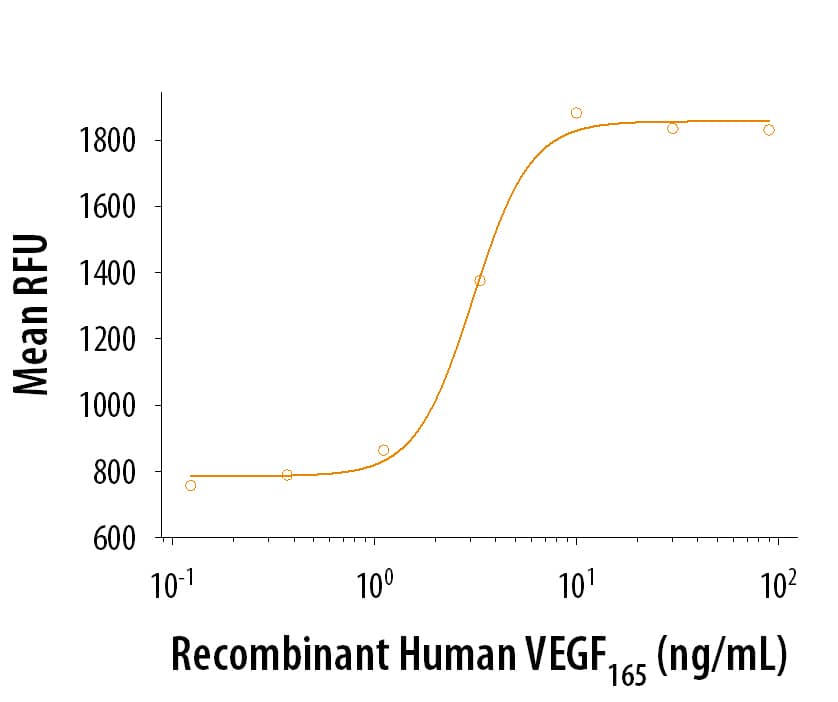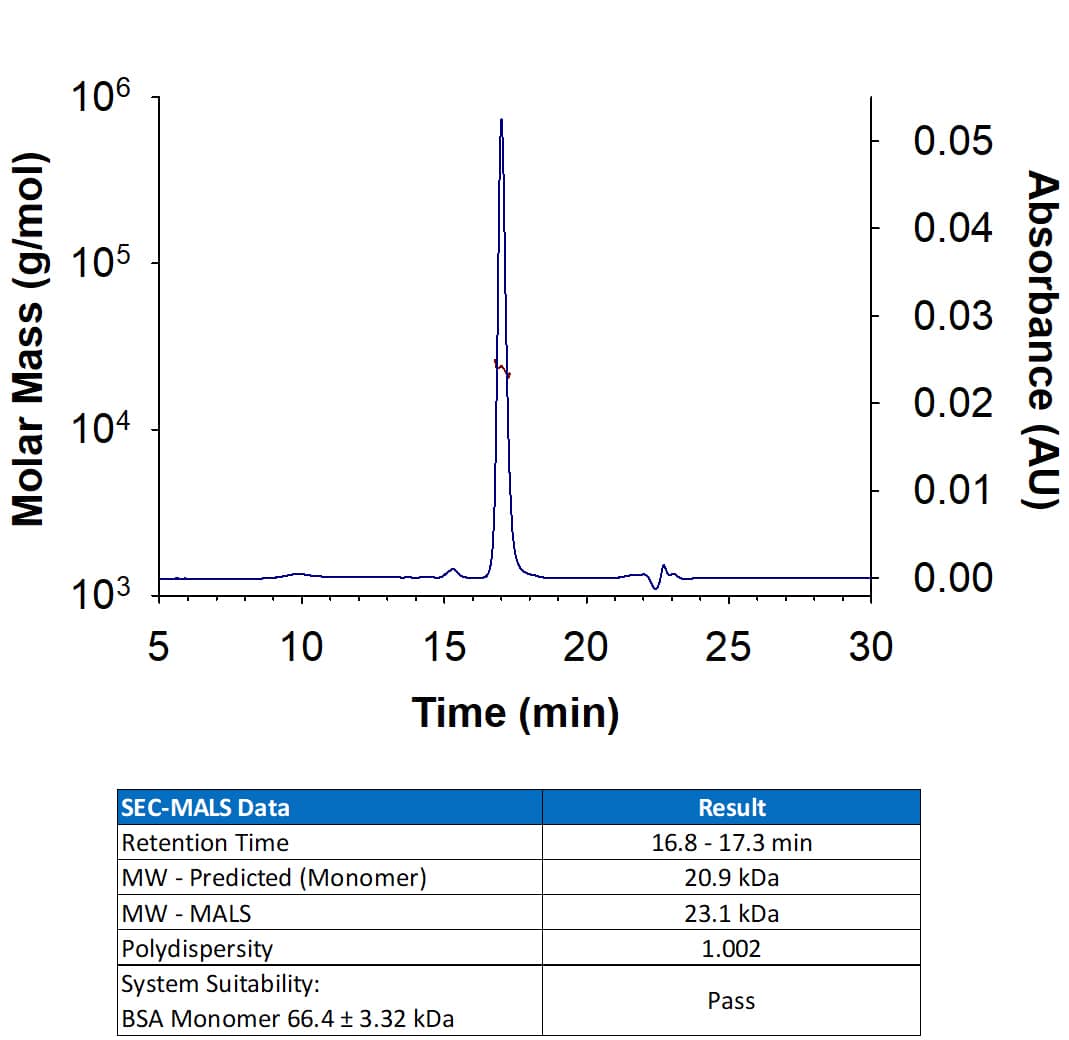Recombinant Mouse MIF Protein Summary
Product Specifications
Pro2-Ala115
Customers also Viewed
Product Datasheets
Carrier Free
CF stands for Carrier Free (CF). We typically add Bovine Serum Albumin (BSA) as a carrier protein to our recombinant proteins. Adding a carrier protein enhances protein stability, increases shelf-life, and allows the recombinant protein to be stored at a more dilute concentration. The carrier free version does not contain BSA.
In general, we advise purchasing the recombinant protein with BSA for use in cell or tissue culture, or as an ELISA standard. In contrast, the carrier free protein is recommended for applications, in which the presence of BSA could interfere.
1978-MF
| Formulation | Lyophilized from a 0.2 μm filtered solution in PBS with BSA as a carrier protein. |
| Reconstitution | Reconstitute at 100 μg/mL in sterile PBS containing at least 0.1% human or bovine serum albumin. |
| Shipping | The product is shipped at ambient temperature. Upon receipt, store it immediately at the temperature recommended below. |
| Stability & Storage: | Use a manual defrost freezer and avoid repeated freeze-thaw cycles.
|
1978-MF/CF
| Formulation | Lyophilized from a 0.2 μm filtered solution in PBS. |
| Reconstitution | Reconstitute at 100 μg/mL in sterile PBS. |
| Shipping | The product is shipped at ambient temperature. Upon receipt, store it immediately at the temperature recommended below. |
| Stability & Storage: | Use a manual defrost freezer and avoid repeated freeze-thaw cycles.
|
Background: MIF
MIF (or macrophage migration inhibitory factor) was the first lymphokine/cytokine to be recognized in the pregenomics era (1, 2). Regardless, it is one of the least understood of all inflammatory mediators (1, 3). Mouse MIF is a 12.5 kDa, 115 amino acid (aa) nonglycosylated polypeptide that is synthesized without a signal sequence (4-7). Secretion occurs nonclassically via an ABCA1 transporter (6). The initiating Met is removed, leaving Pro as the first amino acid. The molecule consists of two alpha -helices and six beta -strands, four of which form a beta -sheet. The two remaining beta -strands interact with other MIF molecules, creating a trimer (2, 8). Structure-function studies suggests MIF is bifunctional with segregated topology. The N- and C-termini mediate enzyme activity (in theory). Phenylpyruvate tautomerase activity (enol- to-keto) has been demonstrated and is dependent upon Pro at position #1 (9). Amino acids 3-23 have also been shown to be reminescent of a GST glutathione-binding domain (10). MIF has proinflammatory cytokine activity centered on aa’s 49-65. On fibroblasts, MIF induces, IL-1, IL-8 and MMP expression; on macrophages, MIF stimulates, NO production and TNF-alpha release following IFN-gamma activation (11, 12). Mouse MIF apparently acts through CD74 and CD44, likely in some form of trimeric interaction (13, 14). Mouse MIF is active on human cells, while human MIF is active on mouse cells (12). Mouse MIF is 99%, 84%, 90%, and 90% aa identical to rat, porcine, bovine and human MIF, respectively.
- Norand, E.F. and M. Leech (2005) Front. Biosci. 10:12.
- Donn, R.P. and D.W. Ray (2004) J. Endocrinol. 182:1.
- Calandra, T. and T. Roger (2003) Nat. Rev. Immunol. 3:791.
- Bozza, M. et al. (1995) Genomics 27:412.
- Mitchell, R. et al. (1995) J. Immunol. 154:3863.
- Flieger, O. et al. (2003) FEBS Lett. 551:78.
- Lanahan, A. et al. (1992) Mol. Cell. Biol. 12:3919.
- Philo, J.S. et al. (2004) Biophys. Chem. 108:77.
- Stamps, S.L. et al. (2000) Biochemistry 39:9671.
- Blocki, F.A. et al. (1993) Protein Sci. 2:2095.
- Sato, A. et al. (2003) Dev. Comp. Immunol. 27:401.
- Bernhagen, J. et al. (1994) Biochemistry 33:14144.
- Leng, L. et al. (2003) J. Exp. Med. 197:1467.
- Meyer-Siegler, K.L. and P.L. Vera (2005) J. Urology 173:615.
Citations for Recombinant Mouse MIF Protein
R&D Systems personnel manually curate a database that contains references using R&D Systems products. The data collected includes not only links to publications in PubMed, but also provides information about sample types, species, and experimental conditions.
17
Citations: Showing 1 - 10
Filter your results:
Filter by:
-
TIMP1 mediates astrocyte-dependent local immunosuppression in brain metastasis acting on infiltrating CD8+ T cells
Authors: Priego, N;de Pablos-Aragoneses, A;Perea-García, M;Pieri, V;Hernandez-Oliver, C;Alvaro-Espinosa, L;Rojas, A;Sanchez, O;Steindl, A;Caleiras, E;Garcia, F;Garcia-Martin, S;Grana-Castro, O;Garcia-Mulero, S;Serrano, D;Velasco-Beltran, P;Jimenez-Lasheras, B;Egia-Mendikute, L;Rupp, L;Stammberger, A;Meinhardt, M;Chaachou-Charradi, A;Martínez-Saez, E;Bertero, L;Cassoni, P;Mangherini, L;Pellerino, A;Ruda, R;Soffietti, R;Al-Shahrour, F;Saftig, P;Sanz-Pamplona, R;Schmitz, M;Crocker, SJ;Calvo, A;Palazon, A;Group, R;Valiente, M;
Cancer discovery
Species: Mouse
Sample Types: Whole Cells
Applications: Bioassay -
Involvement of glycoinositolphospholipid from Trypanosoma cruzi and macrophage migration inhibitory factor in proinflammatory mechanisms promoting cardiovascular injury mechanisms promoting cardiovascular inflammation tThe combined action of glycoinositolphospholipid from Trypanosoma cruzi and macrophage migration inhibitory factor increases proinflammatory mediator production by cardiomyocytes and vascular endothelial cells
Authors: CS Rigazio, N Mariz-Pont, EP Caballero, FN Penas, NB Goren, MH Santamaría, RS Corral
Microbial pathogenesis, 2022-11-12;0(0):105881.
Species: Mouse
Sample Types: Whole Cells
Applications: Bioassay -
Phenotyping of circulating extracellular vesicles (EVs) in obesity identifies large EVs as functional conveyors of Macrophage Migration Inhibitory Factor
Authors: J Amosse, M Durcin, M Malloci, L Vergori, A Fleury, F Gagnadoux, S Dubois, G Simard, J Boursier, O Hue, MC Martinez, R Andriantsi, S Le Lay
Mol Metab, 2018-10-09;18(0):134-142.
Species: Mouse
Sample Types: Whole Cells
Applications: Bioassay -
STAT3 labels a subpopulation of reactive astrocytes required for brain metastasis
Authors: N Priego, L Zhu, C Monteiro, M Mulders, D Wasilewski, W Bindeman, L Doglio, L Martínez, E Martínez-S, SRY Cajal, D Megías, E Hernández-, C Blanco-Apa, L Martínez, E Zarzuela, J Muñoz, C Fustero-To, E Pineiro, A Hernández-, L Bertero, V Poli, M Sánchez-Ma, JA Menendez, R Soffietti, J Bosch-Barr, M Valiente
Nat. Med., 2018-06-11;0(0):.
Species: Human
Sample Types: Whole Cells
Applications: Bioassay -
Novel half-life extended anti-MIF nanobodies protect against endotoxic shock
Authors: A Sparkes, P De Baetsel, L Brys, I Cabrito, YG Sterckx, S Schoonoogh, S Muylderman, G Raes, R Bucala, P Vanlandsch, JA Van Ginder, B Stijlemans
FASEB J., 2018-01-25;0(0):fj201701189R.
Species: Mouse
Sample Types: Recombinant Protein
Applications: Surface Plasmon Resonance (SPR -
CHD7 promotes proliferation of neural stem cells mediated by MIF
Mol Brain, 2016-12-13;9(1):96.
Species: Mouse
Sample Types: Whole Cells
Applications: Bioassay -
Relationship between elevated soluble CD74 and severity of experimental and clinical ALI/ARDS
Sci Rep, 2016-07-22;6(0):30067.
Species: Mouse
Sample Types: Whole Cells
Applications: Bioassay -
Macrophage Migration Inhibitor Factor Upregulates MCP-1 Expression in an Autocrine Manner in Hepatocytes during Acute Mouse Liver Injury.
Authors: Jieshi Xie, Le Yang, Lei Tian, Weiyang Li, Lin Yang, Liying Li
Scientific Reports, 2016-06-08;0(0):2045-2322.
Species: Mouse
Sample Types: Whole Cells
Applications: Bioassay -
Cancer stem cell-secreted macrophage migration inhibitory factor stimulates myeloid derived suppressor cell function and facilitates glioblastoma immune evasion
Stem Cells, 2016-05-27;0(0):.
Species: Mouse
Sample Types: Whole Cells
Applications: Bioassay -
Macrophage migration inhibitory factor promotes cardiac stem cell proliferation and endothelial differentiation through the activation of the PI3K/Akt/mTOR and AMPK pathways
Authors: J Cui, F Zhang, Y Wang, J Liu, X Ming, J Hou, B Lv, S Fang, B Yu
Int J Mol Med, 2016-03-29;37(5):1299-309.
Species: Mouse
Sample Types: Whole Cells
Applications: Bioassay -
The critical role of macrophage migration inhibitory factor in insulin activity.
Authors: Vujicic M, Senerovic L, Nikolic I, Saksida T, Stosic-Grujicic S, Stojanovic I
Cytokine, 2014-06-04;69(1):39-46.
Species: Mouse
Sample Types: Whole Cells
Applications: Bioassay -
Review: putative roles for the macrophage migratory inhibitory factor at the maternal fetal interface.
Authors: Bevilacqua E, Paulesu L, Ferro E, Ietta F, Faria M, Lorenzon A, Costa A, Martucci M
Placenta, 2013-11-01;35(0):S51-6.
Species: Mouse
Sample Types: Whole Cells
Applications: Bioassay -
Deletion of CD74, a putative MIF receptor, in mice enhances osteoclastogenesis and decreases bone mass.
Authors: Mun S, Won H, Hernandez P, Aguila H, Lee S
J Bone Miner Res, 2013-04-01;28(4):948-59.
Species: Mouse
Sample Types: Whole Cells
Applications: Bioassay -
Macrophage migration inhibitory factor inhibition is deleterious for high-fat diet-induced cardiac dysfunction.
Authors: Palud A, Marciniak C, Montaigne D, Marechal X, Ballot C, Hassoun S, Decoster B, Neviere R, Lancel S
PLoS ONE, 2013-03-11;8(3):e58718.
Species: Mouse
Sample Types: Plasma
Applications: Bioassay -
Elevated serum levels of macrophage migration inhibitory factor are associated with progressive chronic cardiomyopathy in patients with Chagas disease.
Authors: Cutrullis R, Petray P, Schapachnik E, Sanchez R, Postan M, Gonzalez M, Martin V, Corral R
PLoS ONE, 2013-02-22;8(2):e57181.
Species: Mouse
Sample Types: Whole Cells
Applications: Bioassay -
Macrophage migration inhibitory factor homologs of anisakis simplex suppress Th2 response in allergic airway inflammation model via CD4+CD25+Foxp3+ T cell recruitment.
Authors: Park SK, Cho MK, Park HK, Lee KH, Lee SJ, Choi SH, Ock MS, Jeong HJ, Lee MH, Yu HS
J. Immunol., 2009-06-01;182(11):6907-14.
Species: Mouse
Sample Types: In Vivo
Applications: In Vivo -
Expression of inflammatory mediators in the otitis media induced by Helicobacter pylori antigen in mice.
Authors: Kariya S, Okano M, Fukushima K, Nomiya S, Kataoka Y, Nomiya R, Akagi H, Nishizaki K
Clin. Exp. Immunol., 2008-08-22;154(1):134-40.
Species: Mouse
Sample Types: In Vivo
Applications: In Vivo
FAQs
No product specific FAQs exist for this product, however you may
View all Proteins and Enzyme FAQsReviews for Recombinant Mouse MIF Protein
Average Rating: 5 (Based on 1 Review)
Have you used Recombinant Mouse MIF Protein?
Submit a review and receive an Amazon gift card.
$25/€18/£15/$25CAN/¥75 Yuan/¥2500 Yen for a review with an image
$10/€7/£6/$10 CAD/¥70 Yuan/¥1110 Yen for a review without an image
Filter by:
Reason for Rating: The MIF I initially ordered did not perform as expected. Support went above and beyond to listen to my concerns, and identify this version of MIF as one that has a free n-terminal pro (critical for my experiment). Sure enough it worked as expected.

















